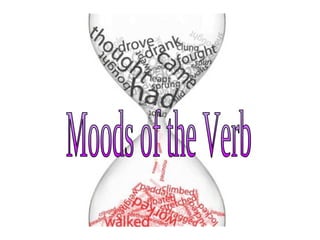
Moods of the Verb
- 1. Moods of the Verb
- 3. Hyper Link : Mast-EAR Piece Get the CD entitled “If I were a boy” from your facilitator. Listen to the song twice. The first round of the listening task should focus on appreciation. So just relax while listening to the song. Now, for the second round, I want you to observe the verbs in the song. What mood of the verb is dominant in the song? Do you know what is a mood? Let us see how far do you know about the moods of the verb. See next page for an activity.
- 4. Knowledge Scan Identify the mood (indicative, imperative, or subjunctive) of each underlined verb. Write your answer on the space provided. __________ 1. The banks demand that interest be reasonable. __________ 2. I insist that you attend to the matter now. __________ 3. It is your duty to go. __________ 4. I wish I were rich. __________ 5. Fill out the form and mail it today. __________ 6. Hurry up. __________ 7. The committee meets today at four. __________ 8. His salary was lower than a shoe clerk’s. __________ 9. What is the controversy about? __________ 10. No sooner had we arrived than the play begun. You may now check your answers. See next page for the key to correction.
- 6. Tab of Ideas : Eye Know Look at these icons, what is the emotion shown by each? Write your answer on the space provided. Check your work using the key on the next page.
- 7. Eye Know : Key The icons show an in love, a shocked, and a happy face. Good job! You identified the emotions correctly! Those emotions are the representations of “mood” for people. However, in our focus for today, we are going to talk about “different” moods – the moods of the verb. Tab of Ideas The mood refers to the forms of the verb indicating the manner in which the action is thought or expressed. There are three basic moods the indicative, imperative, and subjunctive mood. Let us try to talk about one mood at a time.
- 22. Mast-EAR Piece Now that you are done with the review, let us go back to our question a while ago: What mood of the verb is predominant in the song “If I were a Boy”? If your answer is subjunctive mood, you got it right! Do you have other questions about the moods of the verbs? If yes, you may review the Tab of Ideas. If none, see next page for your next challenge. Good luck!
- 24. I bet your Mom and Dad will be proud of this!